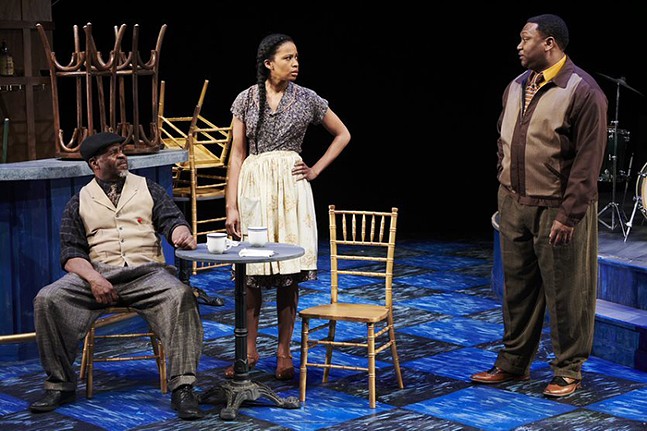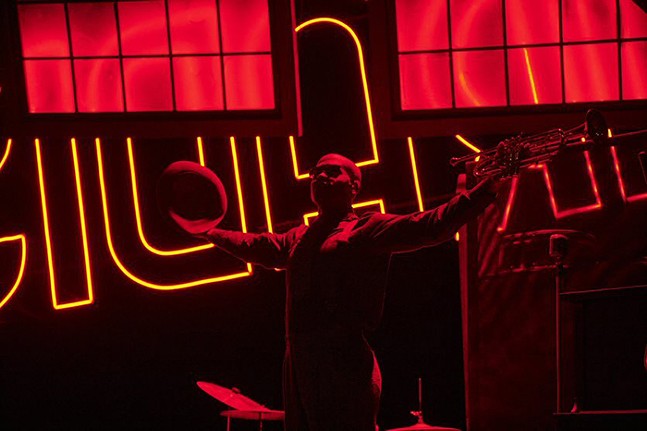Paradise Blue, the latest resonant production from City Theatre, follows five people who live and/or work at the Paradise Club, a jazz spot in Detroit’s Black Bottom neighborhood. While set in 1949 Detroit, the production — being staged now through April 3 — has deep connections to Pittsburgh. It's part of playwright Dominique Morriseau’s Detroit Project, a three-play cycle about Black life in that city inspired by August Wilson’s 10-play Pittsburgh Cycle, which spans every decade of the 20th century.
Morisseau has a masterful ability to embody historical moments with stories so deeply embedded in their historical and cultural context that exposition hardly registers as such, and City Theatre’s production of Paradise Blue, directed by Carnegie Mellon University alumnus Kent Gash, meets her gift with deep care for the play’s historic context.
Blue, played by Rafael Jordan, owns the Paradise Club. A gifted trumpeter like his father, Blue is haunted by the trauma of a violent childhood as he struggles to survive the ongoing trauma of being Black in a country founded on anti-Blackness.
In 1949, when Paradise Blue is set, Black Bottom, a predominantly Black neighborhood on Detroit’s near east side, was “the city’s major African-American community of Black-owned businesses, social institutions, and nightclubs, nationally famous for its music scene in Paradise Valley… Businesses included ten restaurants, eight grocers, 17 physicians, and six drugstores,” according to the Detroit Historical Society. Paradise Valley was a neighborhood adjacent to Black Bottom.
Bad things were brewing, however, for Black Bottom at that time. Albert Cobo, the real-life Detroit mayor whose urban renewal policies razed several blocks of Black Bottom, destroying and displacing a thriving Black community, won the 1949 mayoral election running what The Michigan Chronicle characterized as "one of the most vicious campaigns of race-baiting and playing upon the prejudices of all segments of the Detroit population." Black Bottom was demolished by the city in the 1950s to build an urban redevelopment project and a freeway.
Within this context of impending gentrification, Blue, the Paradise Club owner, is facing pressure from the city of Detroit to sell his club, which is right in the middle of a stretch of other jazz clubs. If he decides to sell, we’re told, the other clubs will likely follow suit. Blue quietly recognizes the potential sale as an opportunity to run away from the club, a proxy for his past. Blue takes his anger out on those around him including Pumpkin, his poetry-loving girlfriend and innkeeper, played by Melva Graham, and P-Sam and Corn, two musicians he pays to accompany him.
P-Sam, the Paradise Club percussionist played by Monteze Freeland (one of City Theatre’s co-artistic directors), sees the writing on the wall and maneuvers with increasing desperation to improve his circumstances. Corn, a pianist played with great empathy by Pittsburgh theater legend Wali Jamal, tries to keep the peace. Into this pressure-cooker saunters Silver, played by the luminous Eunice Woods, a gorgeous widow with a big wad of cash and a murky past.
Freeland, Jamal, and Woods are standouts in a very strong cast, impeccably clothed by Susan Tsu on a set designed by Edward E. Haynes Jr. that balances the abstract and the concrete and makes exciting use of neon.
City Theatre’s production invites comparison between the forces driving this Detroit story of gentrification and displacement of Black communities and Pittsburgh’s past.
"The muscle of Paradise Blue lives in the fabric of cities like Pittsburgh that have struggled to hold firm to the cultural identity of the global majority navigating the wrath of gentrification,” says Freeland. “Bringing this story to life on stage gives voice to many who battle to claim neighborhoods that carry the history and pride of their people.”
Pittsburgh once had its own thriving jazz scene in the Hill District. “The parallel between the destruction of Detroit’s and Pittsburgh’s jazz scenes is too blatant to ignore,” writes marketing intern Meg Knorr for the City Theatre blog in a post about the history of the Hill District, “which is one of the reasons Paradise Blue was chosen for City Theatre’s 2021–2022 subscription season.”
Something else about the performance felt too blatant to ignore, which was the way the dynamic of being a white person in an almost entirely white audience watching a play about Black people navigating a racist world felt like such a normal Pittsburgh experience.
Pittsburgh’s very white theater audiences are inextricable from the city’s intense residential segregation and persistently poor quality of life for Black women, in particular, which are themselves inextricable from mid-century redevelopment projects, like Cobo’s, that devastated the Hill District, East Liberty, and the North Side.
City Theatre’s Paradise Blue, then, can be seen as a confluence of the legacies of urban redevelopment policies in both Detroit and Pittsburgh.
Paradise Blue. Continues through April 3. City Theatre. 1300 Bingham St., South Side. $20-45. citytheatre.culturaldistrict.org



